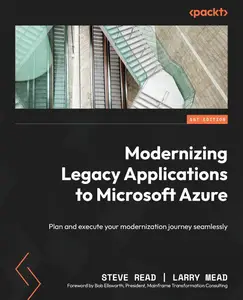
Free Download Modernizing Legacy Applications to Microsoft Azure: Plan and execute your modernization journey seamlessly by Steve Read, Larry Mead
English | September 22, 2023 | ISBN: 1804616656 | 200 pages | PDF | 7.55 Mb
Move legacy applications to a hyper-scale cloud such as Azure using best practices and surefire techniques
Key Features:Meet the needs of mainframe applications using hyper-scale platformMove from a monolithic architecture to a modern cloud architecture by employing a perspective planAvoid the big bang approach to modernization when in need of a phased approach
Book Description:
Organizations have varying circumstances, objectives, and prerequisites when contemplating a hyper-scale cloud solution transformation to a platform such as Azure. Modernizing Legacy Applications to Microsoft Azure uncovers potential scenarios and provides choices, methodologies, techniques, and prospective possibilities for transitioning from legacy applications to the Microsoft Azure environment.
You'll start by understanding the legacy systems and the main concerns regarding migration. Then, you'll investigate why distributed architectures are compelling and the various components of the Azure platform needed during migration. After that, you'll explore the approaches to modernizing legacy applications and the Rs of modernizing (i.e., rehost, refactor, rearchitect, and retire). You'll also learn about integration approaches and potential pitfalls.
By the end of this book, you'll be well equipped to modernize your legacy workloads while being aware of pitfalls and best practices.
What You Will Learn:Understand your current legacy estate's options before moving to AzureMove to a cloud environment from your legacy applicationsBuild equivalent or superior application SLAs in AzureUse interoperability to enable a phased approachIntegrate DevOps to help accelerate modernizationExtend application functionality after migration
Who this book is for:
This book is for both decision makers and implementers including CIOs, CTOs, data and application architects, developers (both legacy and cloud), and business strategists. Prior knowledge of legacy languages and modern cloud-based languages like C#/.NET and Java would be helpful.
